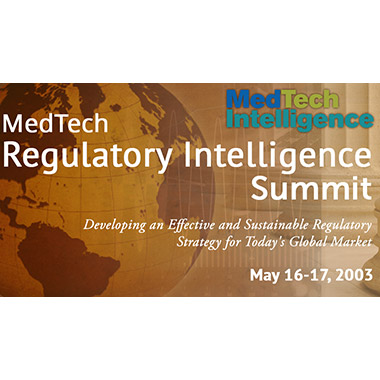

“I am honored to welcome Thierry Bernard as the new chair of the AdvaMedDx Board. With his decades of experience, Thierry brings a clear vision of the work we can accomplish, and I look forward to working with him.”

“I am honored to welcome Thierry Bernard as the new chair of the AdvaMedDx Board. With his decades of experience, Thierry brings a clear vision of the work we can accomplish, and I look forward to working with him.”

On Monday, March 20, the EU MDR extension approved on March 7 came into effect following its official publication in the Journal of the European Union.

On May 16-17, device developers, regulatory affairs and regulatory intelligence professionals will come together in Washington, DC, for two days of education, discussion and networking to share strategies and best practices on navigating current and on the horizon regulatory requirements.

The Food and Drug Omnibus Reform Act (FDORA) authorized FDA to conduct remote device facility inspections. While it will take time for the FDA to take the necessary steps to start performing remote inspections, industry can look to remote regulatory assessments as a potential model.

The increase in global regulatory demands for medical devices has presented new challenges for regulatory affairs and intelligence teams. On May 16-17, The MedTech Regulatory Intelligence Summit will bring together regulatory professionals, device developers and regulators to look at current trends in FDA and international pre-market and post-market requirements, as well as key pain points in achieving regulatory compliance throughout the product lifecycle.

Unhappy with current textbooks and resources for regulatory professionals, Elijah Wreh, Professor of Regulatory Science and Senior Manager Regulatory Affairs at Boston Scientific, authored his own book for industry and future regulators.

New directives and guidance aim to connect patients, physicians and other stakeholders across the healthcare ecosystem with a consistently up-to-date information source for product and safety information that isn’t dependent on paper. Schlafender Hase’s Peter Muller explores the promise of e-labeling and practical next steps required to deliver on these directives.

Cybersecurity in health care is anything but simple. But significant changes can be expected in the coming years.

Hägen, who was a contributor to Medtech Intelligence, spent 28 years building BlackHägen Design to support clients in the development of “mission-critical” products. He was pivotal in the advocacy of human factors and good design practices for medical devices and was at the forefront of patient safety initiatives, helping to found the Industrial Designers Society of America (IDSA) Patient Safety Committee.

Point of care 3D printing of medical devices has abundant potential. However, many regulatory uncertainties remain.